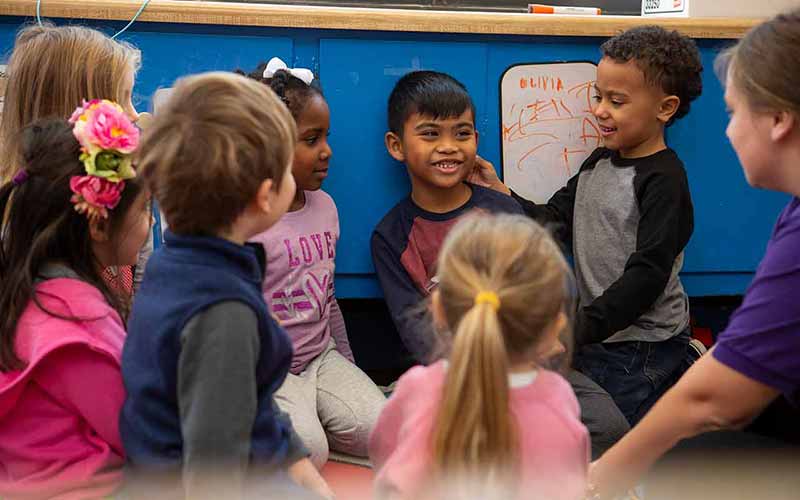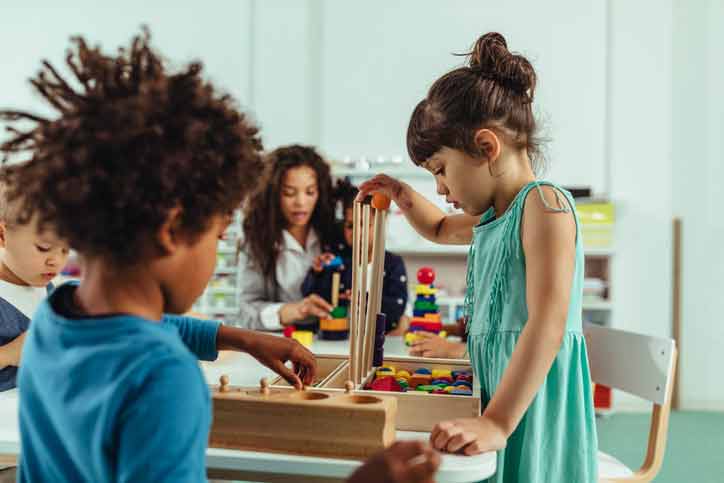Equity and Inclusion
Resources to help you build on every child’s strengths and respond to their needs

Supporting Every Learner
Children benefit from learning experiences that are adapted to meet their physical and developmental skill levels and those that meaningfully reflect their home cultures, languages, and daily lives. Children also benefit when educators take time to reflect on their experiences and address their biases to ensure they are meeting the needs of every child in their care. We share resources for considering equity and inclusion while supporting children’s development of Core Skills.
Disrupting Racial Bias
Teacher-Child Relationships
Stanford University’s Jennifer Eberhardt discusses the power of racial bias and how to disrupt it in our relationships with children.
Confronting our Biases
Teacher-Child Relationships
This NAEYC article shares some key steps educators can use to reflect on and address bias in infant and toddler programs.
Supporting Young Children's Friendships
Peer Relationships
Some children with disabilities need extra support to connect with peers. This podcast describes the importance of early friendships and strategies to support children as they interact with peers.
Considering Culture
Problem-Solving With Others
In this NAEYC webinar, Dr. Isik-Ercan offers transformative yet practical tips educators can use to understand children’s cultural backgrounds and to support children as they encounter and solve social problems.
Inclusive Social Interactions
Problem-Solving With Others
In their magazine issue, Cultivate Learning shares collaborative strategies to support children of different abilities to develop social skills.
Equitable Interactions in ECE
Fostering Empathy
In this webinar, Stephanie Curenton and Bridget Hamre discuss an equity lens that educators can use to understand how children of color feel in the early childhood classroom. They also share strategies to ensure children get the right amount of support.
Help Children Become Thoughtful, Informed, and Brave About Race
Promoting Self-Confidence
When adults openly discuss race and human diversity, they help children build confidence in themselves and comfort with others. This action guide, produced by EmbraceRace, shares small, but powerful steps to nurture race-brave children. Available in English and Spanish.
Recognizing Bias and Promoting Equity
Developing Sense of Self
This short video from the Center of Excellence for Infant and Early Childhood Mental Health Consultation encourages teachers to embrace children’s cultures to support their sense of self.
Our Race-Related Memories
Recognize and Describe Emotions
Dr. Beverly Tatum talks about the strong emotions linked to our race-related memories and the power of talking about race with children to help them understand their emotions and make sense of the world.
Using Social Stories
Supporting Children’s Emotions
Useful for all but especially helpful for children with disabilities and dual language learners, this resource from the Head Start Center for Inclusion provides simple social stories to help children manage emotions and social situations.
Disrupting our Biases
Supporting Children’s Emotions
Our biases influence how we respond to children when they cry. After you read the blog post Crying Helps by the Virginia Infant and Toddler Specialist Network, use our guide to confront your biases and support children’s strong emotions in equitable ways.
Disrupting Implicit Racial Bias
Supporting Children’s Behavior
This NPR segment describes research on preschool educators’ implicit racial biases and how it can cause them to expect more problem behavior from Black boys.
Culturally Appropriate Guidance
Supporting Children’s Behavior
In this webinar, Dr. Ercan offers transformative, yet practical ways educators can start to understand children’s cultural backgrounds to support behavior in the classroom.
The Diversity, Equity, and Inclusion Tool


